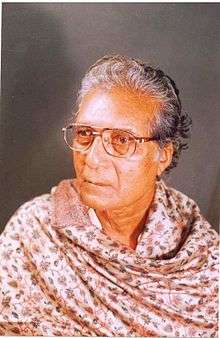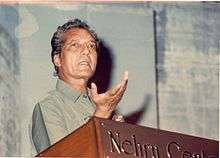Shahid Kabir
| Shahid Kabir شاہد کبیر | |
|---|---|
 Poet Shahid Kabir | |
| Native name | شاہد کبیر محمّد اسرائیل |
| Born |
Shahid Kabir Mohammad Israil May 1, 1932 Nagpur, Maharashtra |
| Died | May 11, 2001 (aged 69) |
| Occupation | poet, writer |
| Language | Urdu, Hindi |
| Nationality | Indian |
| Education | Bachelor of Arts |
| Genres | Ghazal, Geet, Novel |
| Notable works |
|
| Years active | 1952 - 2001 |
| Spouse | Akhtar Kabir (1960-2001), his death |
| Children |
Seema Rehman (daughter) |
|
| |
| Signature |
 |
Shahid Kabir (1 May 1932, Nagpur - 11 May 2001) was a Urdu language poet and writer from Maharashtra, India. He was an active writer since 1952, writing poetry, short stories and articles. He was mainly popular for his ghazals. His significant works includes Kachchi Deewaren (1958; Novel), Charon Aour (1968; Collection of ghazal) and Pehchaan (1999; Collection of ghazal). He was awarded by Maharashtra State Urdu Academy. His ghazals have been sung by several Indian singers including Jagjit Singh, Chitra Singh, Hariharan, Chandan Dass, Munni Begum and Sabri brothers.[1]
Life

Kabir was born on 1 May 1932 in Nagpur, a city of Maharashtra, to Mohammad Israil and Khairun Nisa. He got his schooling from Anjuman High School. He completed his Bachelor of Arts from Junior College, Nagpur with Urdu as one of his subjects. He married Akhtar Kabir in 1960 and they had three daughters; namely Seema, Almas and Shiraza; and four sons; namely Khalid, Sajid, Faraz and Sameer. His son Sameer Kabeer is also a poet.[2]
Career

He worked at Food and Marketing Department of Central Government, Delhi in 1950; where he got acquainted with other poets like Ali Sardar Jafri, Zuber Rizvi and Naresh Kumar Shad. He got influenced by works of these poets and started to writer poems. Latter, he transferred at Nagpur. First of his poetry to be set to music was a ghazal, Phoolon ki barsaat, which was sung in Qawwali style by Hanif Agrawal. Subsequently, his ghazals where sung by other well-known singers such as Hariharan, Jagjit Singh, Chitra Singh, Lata Mangeshkar, Pankaj Udhas, Udit Narayan and Rahat Fateh Ali Khan. A ghazal written by him, Uski gali mein phir mujhe ek baar len chalo, has been sung and popularise by many singers including Rais Khan, Munni Begum, Chandan Dass, Salman Alvi and Sabri brothers.[3] In 1957, he was the Screenwriter for the drama Mirza Ghalib presented in the Fine Arts Drama Competition at Rastrapati Bhawan, New Delhi. He served as member of Nagpur University Board of Studies for Urdu language from 1991 to 1995.[1]
Works
Kachchi Deewaren, his first book (Novel), was published in 1958, followed by Charon Aour (1968; Collection of ghazals), Mitti Ka Makan (1979; Collection of ghazals) and Pehchaan (1999; Collection of ghazals). Pehchaan was also published in Devnagari script in 2002, compiled by his son Sameer Kabeer. The collection of his Geet; Ghazals and Nazm, Us Ki Gali, has been compiled by Sameer Kabeer in DevaNagri and Urdu script in 2014.[2] He established the link between the Reevayati (old) shayari and the Jadid (new) shayari.[3]
Recognition
His Collection of ghazals Mitti Ka Makan (1979) and Pehchaan (1999) was awarded first prize by Maharashtra State Urdu Academy. His collection of modern ghazals Charon Aour was included in the Dr. Babasaheb Ambedkar Marathwada University course. His poems have been included in the Urdu textbooks for the 12th standard as prescribed by the Maharashtra State Board of Education.[1]
References
- 1 2 3 Naqvi, Nita Awatramani. "Shahid Kabir: Biography". Urdu Poetry Archive. Retrieved 2016-04-30.
- 1 2 Kabeer, Sameer (2014). Us Ki Gali. Luknow: Voice Publication. p. 5. ISBN 9788192429205.
- 1 2 Mathur, Barkha (2014-05-11). "Shahid Kabir, a poet less remembered". The Times of India. Retrieved 2016-04-30.